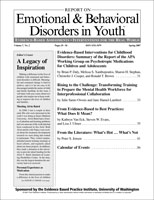The First Step to Success Program for Preventing Antisocial Behavior in Young Children: Update on Past, Current, and Planned Research
Author: Hill Walker, Ph.D..; John Seeley, Ph.D..; Jason Small, B.A..; Annemieke Golly, Ph.D..; Edward Feil, Ph.D. Herbert Severson, Ph.D..
Source: Volume 08, Number 01, Winter 2008 , pp.17-24(8)

< previous article |next article > |return to table of contents
Abstract:
This article discusses the First Step to Success intervention program, a selected, early intervention to assist behaviorally at-risk students in achieving a successful beginning to their school careers. The First Step program has three modular components—universal screening, school intervention, and parent training—and is applied individually to one child at a time in K-3 classroom settings. First Step utilizes parents, teachers, and peers in the intervention process and connects families and schools together in a partnership that builds a foundation for fostering school success and reducing mental health problems. This article provides a brief overview of the First Step program and the research base that has developed to date on it, discusses the development and trial testing of the intervention, and describes a statewide, scaled-up application of the program. This article reviews results from ongoing program research and also describes additional planned research. An appendix lists all publications to date on the First Step program and cites research reviews in which the program has been recommended as a best or preferred practice.Keywords:
Affiliations:
1: University of Oregon College of Education; 2: Oregon Research Institute; 3: Oregon Research Institute; 4: Oregon Research Institute; 5: Oregon Research Institute.